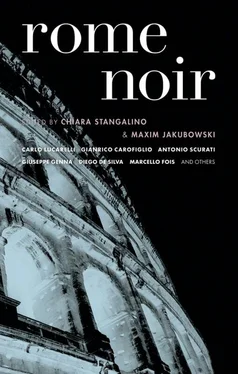Джанрико Карофильо - Rome Noir
Здесь есть возможность читать онлайн «Джанрико Карофильо - Rome Noir» весь текст электронной книги совершенно бесплатно (целиком полную версию без сокращений). В некоторых случаях можно слушать аудио, скачать через торрент в формате fb2 и присутствует краткое содержание. Город: New York, Год выпуска: 2009, ISBN: 2009, Издательство: Akashic Books, Жанр: Детектив, на английском языке. Описание произведения, (предисловие) а так же отзывы посетителей доступны на портале библиотеки ЛибКат.
- Название:Rome Noir
- Автор:
- Издательство:Akashic Books
- Жанр:
- Год:2009
- Город:New York
- ISBN:978-1-933354-64-4
- Рейтинг книги:3 / 5. Голосов: 1
-
Избранное:Добавить в избранное
- Отзывы:
-
Ваша оценка:
- 60
- 1
- 2
- 3
- 4
- 5
Rome Noir: краткое содержание, описание и аннотация
Предлагаем к чтению аннотацию, описание, краткое содержание или предисловие (зависит от того, что написал сам автор книги «Rome Noir»). Если вы не нашли необходимую информацию о книге — напишите в комментариях, мы постараемся отыскать её.
Rome Noir — читать онлайн бесплатно полную книгу (весь текст) целиком
Ниже представлен текст книги, разбитый по страницам. Система сохранения места последней прочитанной страницы, позволяет с удобством читать онлайн бесплатно книгу «Rome Noir», без необходимости каждый раз заново искать на чём Вы остановились. Поставьте закладку, и сможете в любой момент перейти на страницу, на которой закончили чтение.
Интервал:
Закладка:
Michele Saggese, the boys’ father, was the only one in the neighborhood who in his youth had frequented the halls of the university, the only one who used an accountant to pay his taxes, the only one who was seriously tormented by the thought that his children might hang out with those of the neighbors. That is, us. He lost sleep at night over it. Cristiano and Stefano, in turn, believed that a journey through the urethra of an individual convinced that government securities and the separation of garbage for recycling were the basis of civilization deserved to be repaid in the coin of obedience. As a result, they stayed clear of us. And, given that the southernmost reaches of the neighborhood gave us a sense of melancholy (we couldn’t bear the sober schematicism of the courts), the Saggese twins made tennis the St. Helena of those who have never passed through Waterloo. How many matches did they play thanks to us? Hours and hours of perfecting their technique, entire afternoons of following the ball. Every so often their father showed up too. He watched them with satisfaction, nursing the impossible dream of a Davis Cup win in doubles. But in general the only difficult finish line that losers manage to cross has to do with logic: They are capable of reaching excellent levels of mediocrity. In fact, at the time there was talk everywhere of Serena and Venus Williams. But of the Saggese twins at Wimbledon, only the intimation of a study vacation.
Thus, when Stefano Saggese went to retrieve a ball that had ended up outside the fence, the scoreboard with which he mentally covered the distance that separated him from match point shattered in the face of a different sort of calculation. One, two, three, four, five police cars... He raised his head and shared with his clone the same conclusion that receivers of stolen goods come to before vanishing silently through one of the many service doors available to those who — in an immense kingdom of speculators, small-town whores, and drug addicts such as Rome was in the ’80s — appreciate a certain discretion along with the flow of cash.
“Something is happening...” Stefano Saggese said.
Since at a certain point the number of kids with no police record was not sufficient even for a bridge tournament, I never really understood the procedure. Ten cops surround a neoclassical-style villa full of expensive junk. While two or three approach the gate, two more take down the license number of the Ferrari, one maybe communicates with headquarters, but who is authorized to talk to the passersby? Whoever this nameless man is, his job is even more monotonous than that of the person playing the role of the herald in a Shakespearian tragedy. Two lines and exit: Usually passersby haven’t seen anything, and the cop has to let them go.
But this time the script was twisted. The cop who was assigned to interview the passersby, and whose gaze up to that point had been drifting among high-cylinder still lifes, saw the sunny desert of the street disintegrate because of two figures in movement. Spontaneously they advanced toward him. Neither was more than five-six: red Lacoste shirt, blue shorts, each holding a Maxima Corrado Barazzutti racket. If you looked closely — the herald in uniform was tempted to squint — it was the same person.
“Need help?” asked the optical illusion.
It wasn’t curiosity that impelled the Saggese twins toward the police cars. They were not fans of adventure, and they would not have approached the Canditos’ house even if they had found out that a UFO had landed on it. Another force was pushing them, an impalpable feeling of rancor nursed for years, serve after serve after volley after serve, a grudge fueled by the hypnotic monotony of white stripes on a red background, a revenge that the cowardly little twins could satisfy only with the weapons of an informer.
“Yes,” the policeman smiled. “Does the Candito family live here?”
“This is their house,” one of the boys confirmed, coming dangerously close to the first orgasm of his life.
Then love of pedantry overcame love of betrayal. Stefano Saggese felt compelled to add: “But Mr. and Mrs. Candito aren’t home. They’re on vacation in the Canaries.”
“We aren’t looking for Mr. and Mrs. Candito,” the policeman explained. “We’re looking for Saverio, one of the kids. Do you know him?”
Stefano Saggese turned pale, and from that moment he was unable to distinguish the explosion of joy from an abortive experience. His twin lowered his eyes and assumed the thoughtful expression of one who can never enjoy a victory. If it had been Pippo Candito, Saverio’s father, who in a few minutes was to come down the steps of the villa with handcuffs on his wrists, his face swollen with shame, the Saggese twins would have received living proof of that maxim which their father would never tire of repeating with stylized gravity, even if it had concerned a Pilgrim just off the Mayflower: the same maxim that the fruit of those loins believed to be confirmed when, shut in their room, they read comics whose every detail — including the name of whoever did the lettering — they grasped, except for the subtle ironic streak (“Crime doesn’t pay,” Dulls reflected, behind bars at the end of an episode of Alan Ford , only to be found, a few issues later, safe, relaxed and smiling, in a presidential suite surrounded by women in leopard-skin jackets). But the police wanted Saverio. Which, logically, should have made the Saggese twins even happier: Up to a certain age a sense of competitiveness emerges only between contemporaries. But the thought that someone their age, in fact someone who, along with five or six others, had been able to win for himself a disproportionate amount of chaos and diversion, had now used that same mysterious magnet to attract to the driveway of his own house five police cars — well, that was a very complicated thought to come to terms with: The Saggese twins felt the dizzy sensation of envying even the downfall of their bitterest enemy.
“We know him,” Cristiano Saggese confirmed. “What do you want him for?” he added, his cheeks completely red.
“Pushing heroin. Is this him?” The policeman showed them a small salmon-colored rectangle.
The twins nodded. The cop asked if they had seen him in the past hour, hour and a half, and the two boys shook their heads no. At that point they were dismissed, and they vanished obediently into the haze, just as, probably rightly, they exit from this memoir as well. I don’t know what happened to them. Usually, small concentrations of rancor and servility condemned to burning defeat on the playing field of youth re-ascend the slope, with the passing of time, to discover a tenacity, a sense of struggle... they find themselves with the entire armamentarium needed for nursing what the MBAs call “ambition.” So I can imagine them in the role of financial consultants, as, in their office in Prati watched over by images of the Pope and fake Campbell’s soup can silk screens, they inundate a potential client with patter. Neither debilitating tumors nor fifteen months in jail for price-fixing: My only wish for them is that at some point during one of these informal encounters — in order to hook the wallet of their prey, the postgraduates cunningly offer some sort of anecdote — the potential client feels free to depart from the subject long enough to ask: “And how was your adolescence?”
“Good, thanks,” one of the Saggeses would answer.
Then he would go out to dinner at the Cavalieri Hilton, return home, and wake up in the middle of the night covered with sweat, believing that he still has in his ears the sounds of a hundred thousand tennis balls that won’t stop rebounding off the walls of an empty room.
The plaster discus throwers were nothing. After having made vain use of the intercom and then the doorbell, the police went over the gate, slid a thin object very much like a credit card along the front door lock, and faced the semidarkness of a hall tiled in pink marble. One of them loosened the cord of a curtain. The spectacle that met their eyes outdid the murkiest fantasies of a prop man with an unlimited budget.
Читать дальшеИнтервал:
Закладка:
Похожие книги на «Rome Noir»
Представляем Вашему вниманию похожие книги на «Rome Noir» списком для выбора. Мы отобрали схожую по названию и смыслу литературу в надежде предоставить читателям больше вариантов отыскать новые, интересные, ещё непрочитанные произведения.
Обсуждение, отзывы о книге «Rome Noir» и просто собственные мнения читателей. Оставьте ваши комментарии, напишите, что Вы думаете о произведении, его смысле или главных героях. Укажите что конкретно понравилось, а что нет, и почему Вы так считаете.












